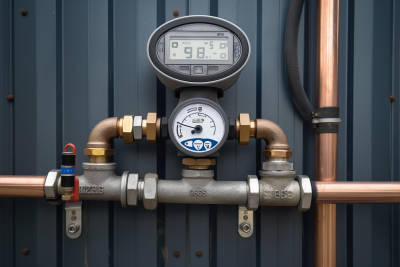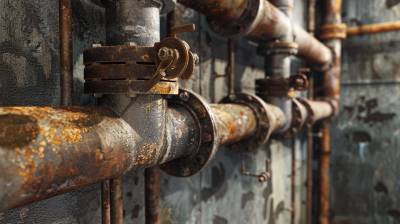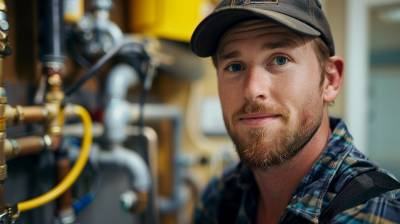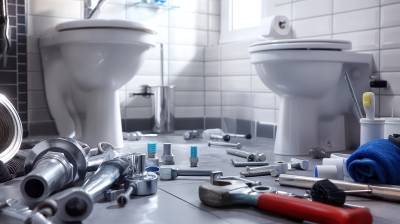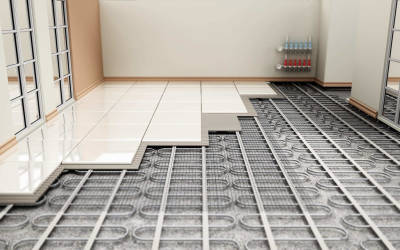The term "pipe fitter" may not be familiar to everyone, but without piping systems, our daily lives would be significantly different. Piping systems distribute water, gas, and oil, which are critical for homes, cars, and a range of other applications. Any installation, maintenance, or repair of these systems is dependent on the expertise of a pipe fitter. Whether you're a seasoned professional, a novice in the trade, or simply an interested outsider, this article aims to delve deep into the world of pipe fitting, clearly explaining the importance, process, and requirements of this critical profession.
Understanding the Role of a Pipe Fitter
A pipe fitter, often referred to as a steamfitter, is a trained professional who specializes in installing, assembling, fabricating, maintaining, repairing, and troubleshooting mechanical piping systems. These systems transport liquids, chemicals, or gases to various types of establishments, including homes, businesses, and industrial plants.
The Importance of Pipe Fitters in Everyday Life
Pipe fitters play a pivotal role in society, as they ensure that homes, offices, factories, power plants and more have a steady supply of water, gas, and other essential resources. The work done by pipe fitters directly affects the health, safety, and quality of life for many people.
Ensuring Safe And Clean Water
Pipe fitters contribute significantly to the delivery of clean, potable water to homes and businesses. They install and maintain the necessary piping systems, which involves selecting the appropriate pipes, ensuring they are installed at the proper angle, and regularly checking for leaks and other issues.
Contributing to Energy Supply
- Gas networks: Pipe fitters install and manage the vast network of pipes used to transport natural gas for heating homes and powering various appliances.
- Power plants: In nuclear and thermal power plants, pipe fitters play integral roles in providing efficient and safely functioning systems for steam and water flow.
- Oil production: In the oil industry, pipe fitting is essential for establishing intricate networks necessary for oil extraction, refining, and distribution.
The Skills Required To Be A Pipe Fitter
The complexity of the pipe fitter’s job requires a specific skillset, including technical knowledge, analytical thinking, problem-solving capabilities, and physical strength to carry out the tasks efficiently.
Technical Knowledge and Training
A comprehensive understanding of blueprints, layout plans, and system designs is essential for pipe fitters. They also need to be knowledgeable about different types of pipes and fittings, their characteristics, and appropriate uses. Some establishments require their pipe fitters to complete either an apprenticeship or a vocational course equipping them with the necessary skills for the job.
Physical Strength and Stamina
Installing and repairing pipe systems can be physically demanding. Pipe fitters need to have the strength to handle heavy materials and the stamina to work in various conditions, which may sometimes involve working at heights or in confined spaces.
The Complex Processes Involved in Pipe Fitting
Beyond just choosing and connecting pipes, the work of a pipe fitter involves several technical processes, from understanding complex system designs to troubleshooting potential issues. Here is a brief rundown of the most common processes involved.
Reading and Interpreting Blueprints
Pipe fitters begin any project by carefully studying the blueprints, which help them understand where pipes will be laid, which type of pipes are to be used, and how these pipes are to be connected.
Identifying and Selecting Pipe and Equipment
Numerous types of pipes are used in pipe fitting, each serving a unique purpose. Pipe fitters should be able to identify and choose the right pipes and related equipment for each specific job.
Assembling and Securing Pipes
Depending on the system’s blueprint, pipe fitters cut and shape pipes according to the needed size. They then use joining methods such as welding, cementing, or threading to connect these pipes, and secure them in place using brackets, clamps, or other hangers.
Inspection and Troubleshooting
Once the pipes are installed, pipe fitters conduct pressure tests to ensure that the system is watertight and secure. They also remain responsible for detecting any repairs or maintenance needs, often troubleshooting issues based on observations or complaints.
Whether you are looking to join the trade as a pipe fitter or just an enthusiast wanting to understand the core essence of pipe fitting, it's quite evident the role is demanding yet rewarding, requiring both physical and cognitive skills. Pipe fitters play an integral role in building and maintaining the infrastructure of modern life, and their skills are integral in every home, establishment, and industry around the world.
Frequently Asked Questions about Pipe Fitters
What roles and responsibilities does a pipe fitter have?
A pipe fitter has several responsibilities which typically include designing and installing detailed pipe systems, setting layouts for pipes, using various tools to modify pipes to the desired size, and testing the installed systems. They often work with blueprints and must focus on accuracy and precision to prevent issues like leaks and corrosion.
What kind of training or education is needed to become a pipe fitter?
Usually, pipe fitters start their journey with a high school diploma or equivalent. Vocational and technical schools offer relevant training and programs for aspiring pipe fitters, including welding, blueprint reading, and local codes and regulations. There's also an apprenticeship phase where individuals learn the trade under the guidance of seasoned professionals.
Where can I find pipe fitter apprenticeship opportunities?
Pipe fitter apprenticeships are frequently offered by trade unions, contractor associations, and similar organizations. These programs typically run for several years and offer a mix of hands-on training and technical education. Websites such as Apprenticeship.gov in the US provide a database of available apprenticeships.
What skills are important for a pipe fitter to have?
In addition to technical knowledge, pipe fitters should have a strong grasp of math for accurate measurements and calculations. They should have good physical stamina for heavy lifting and working in challenging environments. Problem-solving, critical thinking, and communication skills are also valuable.
Is certification required to work as a pipe fitter?
While not always mandated, certification can certainly increase a pipe fitter's job prospects. Certifications demonstrate a professional's competence and adherence to industry standards. They usually require passing an exam and may necessitate continued education to maintain.
What is the job outlook for a pipe fitter?
According to the Bureau of Labor Statistics, jobs for pipe fitters are expected to grow over the next few years. This growth is driven by the need for pipe fitters in construction and maintenance, the latter due to aging pipe systems in existing buildings.
What is the average salary of a pipe fitter?
While the salary can widely vary based on factors like location, experience, and certifications, the median annual wage for pipe fitters was about $55,160 in May 2019 according to the Bureau of Labor Statistics.
Can a pipe fitter specialize in a certain area?
Yes, many pipe fitters choose to specialize in a specific area, such as steamfitting, gas fitting, or plumbing. Specializing can often lead to higher paying job opportunities and a more defined career path.
What safety issues do pipe fitters usually encounter?
Pipe fitters regularly work with heavy materials and tools, so there's a risk of physical injury. They may also be exposed to hazardous materials like asbestos or lead. Therefore, following safety protocols and wearing appropriate personal protective equipment is of utmost importance.
What is the difference between a pipe fitter and a plumber?
While the roles may seem similar, pipe fitters generally deal with high-pressure industrial systems for heating and cooling, water treatment, or manufacturing, whereas plumbers predominantly work on water and drainage systems in residential or commercial buildings.
Pros and Cons of Being a Pipe Fitter
Pros of Being a Pipe Fitter
Value of Skillset
- Pipe fitting is a specialized skill with high demand in construction, oil, gas, and manufacturing industries, making it a valuable trade career.
- Qualified pipe fitters are crucial in settings that require precise installations and maintenance of pipeline systems.
Income Potential
- Pipe fitters have substantial earning potential. With experience, the increase in salary can be quite significant.
- There is also opportunity for overtime, enhancing earnings. In urgent situations or emergencies, pipefitters may be required to perform off-hour duties with additional compensation.
Job Stability
- As long as there are buildings being constructed or maintained, there will always be need for pipe fitters, making it a stable job.
- With commercial and residential infrastructure development across the globe, the demand for pipe fitters is expected to grow progressively.
Travel Opportunities
- Pipe fitting jobs can provide opportunities to travel, since contractors are constantly looking for pipe fitters across multiple locations.
- Given the global distribution of major industries that employ pipe fitters, international job opportunities are also possible.
Cons of Being a Pipe Fitter
Physically Demanding
- Pipe fitting can be physically taxing as it often involves long hours of standing, kneeling or climbing, and lifting heavy equipment.
- Work can be strenuous and might cause health issues such as back pain, and injuries.
Work Environment and Conditions
- Pipe fitters often have to operate under tough conditions, such as high-altitude work sites, confined spaces, or outdoors in diverse weather conditions.
- Work sites can also be noisy, dusty, or muddy, which can cause discomfort.
Long and Irregular Work Hours
- Pipe fitters often work long hours which can affect work-life balance.
- They may also have to work at night, on weekends, or holiday due to emergencies or to minimize disruption in commercial settings.
Occupational Hazards and Safety Risks
- Pipe fitting comes with risks. Workers often handle hazardous materials and could potentially face accidents due to the complex machinery and high-pressure systems they work with.
- Despite stringent standards and safety protocols, the risk of injury cannot be completely eliminated.
Initial Investment in Education and Tools
- Becoming a pipe fitter requires a considerable investment of time and money in technical training and apprenticeship programs.
- The cost for personal tools can be high, with the necessity for regular upgrades and maintenance.
Summary
A pipe fitter is undoubtedly an unsung hero in our everyday lives. Their work is seen in all aspects of infrastructure - from our homes and offices to factories and power plants. Without their skill and expertise, the buildings we live and work in wouldn’t function as required. They ensure that water, gas, and other vital resources reach us, making our lives convenient and comfortable.
However, the skill-set of a pipe fitter does more than just fit and maintain pipes. Their attention to detail, problem-solving abilities, and dedication play an essential role in their job, ensuring safety and efficiency. They bring life to blueprints and make sure everything runs smoothly. It's not just about fitting pipes; it's about creating robust systems, a testament to their technical skills and knowledge.
Many people might not realize the significant role a pipe fitter plays in society, but one can't deny their undeniable impact. From the smallest home to the largest industrial establishment, their contribution is immense. So, when we switch on a faucet, warm our homes, or enjoy any other amenity, let's remember there's a pipe fitter to thank for their seamless work and dedication. Truly, pipe fitters are essential cogs that keep the wheels of our society turning smoothly.
About West Coast Hydronics & Plumbing
Welcome to West Coast Hydronics & Plumbing, your go-to plumbing and hydronics specialists in Sacramento, CA. We've been providing high-quality plumbing solutions to our valued customers for many years, taking pride in our technical skills, friendly service, and industry knowledge. Whether you're dealing with a small leak or a massive plumbing project, you can always count on us to deliver the best possible solution. Don't just take our word for it, take a moment to explore the wide array of services we offer.



